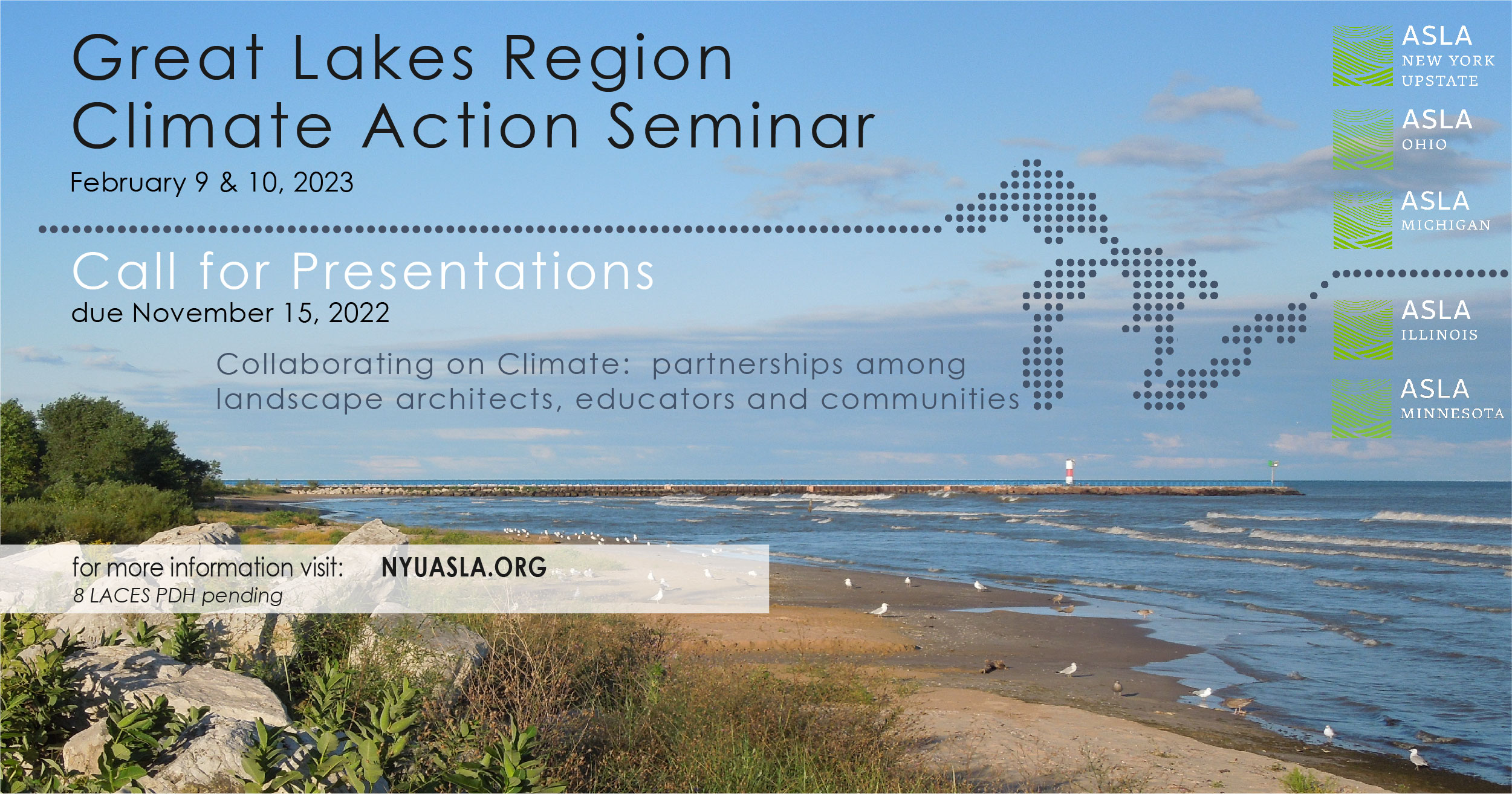ASLA Great Lakes Region Climate Action Seminar: Call for Presentations
Posting Date: September 26, 2022
Deadline: November 15, 2022
Virtual Seminar

Great Lakes Region Climate Action Seminar – Call for Presentations
The NY Upstate, Ohio, Michigan, Minnesota, and Illinois Chapters of ASLA are collaborating on this continuing education opportunity and are pleased to announce the Call for Presentations for the 2023 Great Lakes Region Climate Action Seminar. This is the second event in a series aimed to explore and expand landscape architecture’s role regarding climate change impacts occurring in urban and natural systems across the Great Lakes Region.
The theme in 2021 addressed the unique challenges of climate change and resiliency in the Great Lakes Region and how practitioners and academics are facing these issues from scientific and policy viewpoints. The theme for 2023 focuses on the partnerships among landscape architects, academics, and communities that are critical for more resilient cities and coastal regions.
Collaborating on Climate: Partnerships among landscape architects, educators, and communities to strengthen collective climate action
February 9 - 10, 2023
Format: Two half-day virtual seminars with four one-hour sessions each day
Description: The Great Lakes Region is one of the most significant ecosystems on Earth containing 95% of freshwater in North America and home to over 50 million people in the United States. Although the region’s climate is considered less volatile than other regions and coastlines of the US, the Great Lakes are not exempt from the impacts of climate change. Growing evidence of biophysical changes calls for increased effort to translate that knowledge into design and planning action. Climate change is already affecting Great Lakes communities through more intense and frequent flooding, increased severity of urban heat island effect with impacts to human health, threatening coastlines, and altering ecosystems and habitats, all in the face of aging infrastructure, shifting economic sectors, and exacerbated inequalities across communities. The region is also expected to be a future climate migration refuge, which places additional pressure on physical design and planning to prepare for a growing population.
This symposium will bring landscape architects, educators, and communities together to talk about the pressing challenges facing our region and will unpack how critical partnerships are taking shape to address new challenges and opportunities.
Topics might include, but are not limited to:
- What new partnerships are developing between landscape architects, educators, and communities to address issues and impacts of climate change? How are those relationships being formed?
- What new project types are emerging through these partnerships that might not happen in a typical client service model or academic study?
- How is knowledge shared, transferred, and created within those partnerships and projects?
- How are the unique climate-driven needs of communities being discussed today within design offices, our ASLA state chapters, and academia?
- How can the profession of landscape architecture better reach communities to work together?
- What new venues are needed to develop stronger means of connection and collaboration among landscape architects, academics, and communities? How can this work be more inclusive, better supported, resourced, and funded?
- How have landscape architects served as contributors to regional climate planning within the Great Lakes Region? What specific role and impact has landscape architecture had on regional climate plans?
We hope to receive a range of responses on this symposium topic from landscape architects working across private, public, and non-profit sectors. Please also forward the Call for Presentations along to your community collaborators and colleagues in allied fields. Presentations can be made by individuals or groups. We welcome and encourage community collaborators to participate in presentations.
Components for your submission. We’re requesting the following information from submitters:
- a 500-1,000-word statement. The statement should include a description of the collaborative partnership (i.e., who was involved); the project undertaken together; the methods for working together; and what was learned and developed in that shared partnership. Please elaborate on any aspects of the partnership that led to critical insights or developments in the project.
- Five (5) images showing the project site, communities and collaborators, and working process. Please submit these as jpegs with total file size of the images not to exceed 10MB.
- Any links or references to the partnership and/or collaborative project such as news articles, a website, master plan or planning report, notice of grant received, or other sources that provide different ways of understanding the collaboration and its impact.
- Three learning objectives of what the learner is expected to learn as a result of the session.
Schedule
Call for proposals issued | September 26, 2022
Submissions due | November 15, 2022
Notifications of acceptance | December 15, 2022
Submissions can be made here:https://forms.gle/tyUxc1RWp5SMBdj1A
Questions about the Call for Presentations: Please contact Mary Pat McGuire at [email protected] and/or Stacey Libra at [email protected].
Potential future publication: Given the impressive range of projects and partnerships represented at the 2021 event and anticipated for the 2023 event, members of the organizing committee are interested in publishing the presented work through an article, white paper, or book. Mary Pat McGuire (ALSA-IL) will contact submitters to share more information and to seek participation including co-editors.
